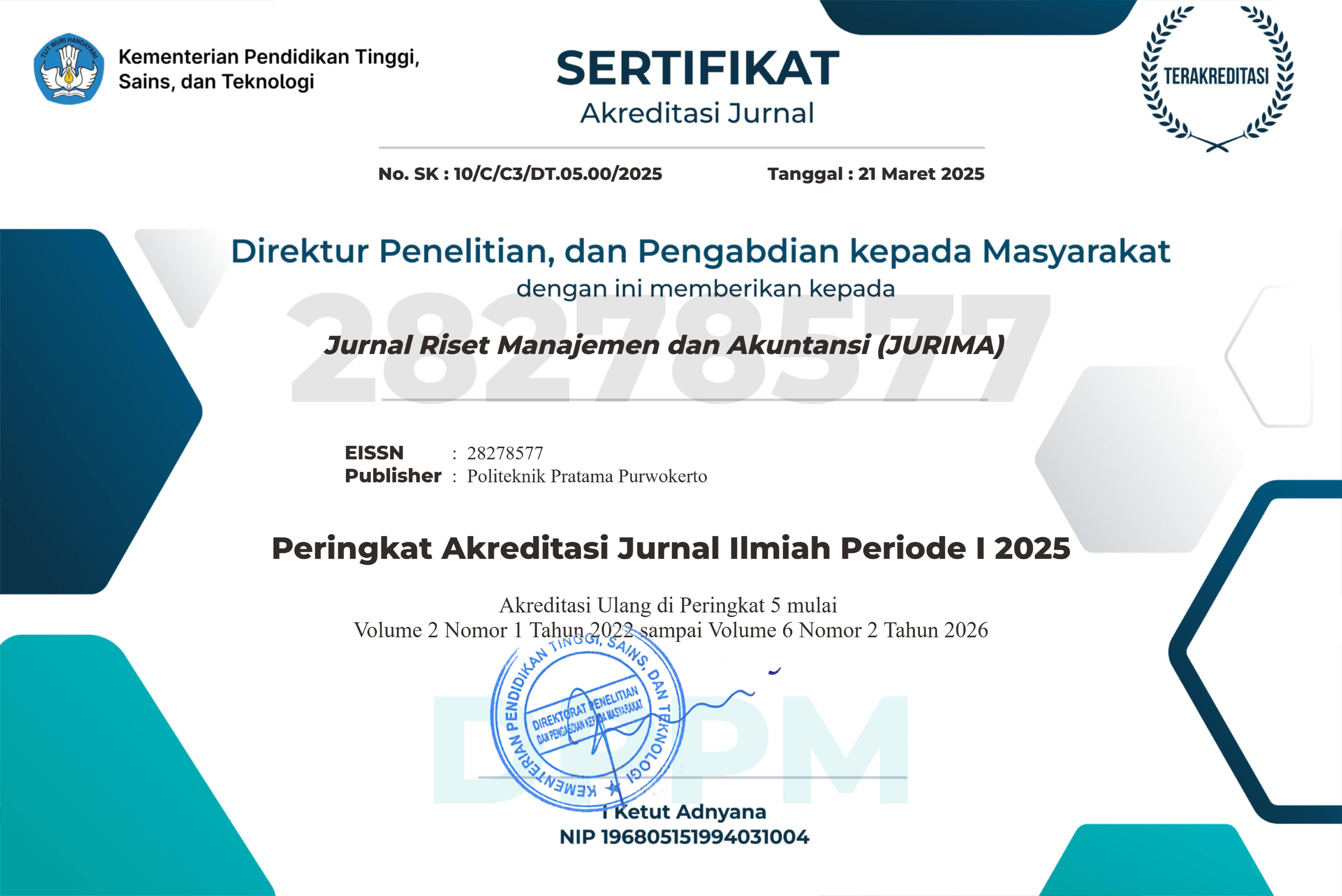Pengaruh Etos Kerja Terhadap Kinerja Pegawai melalui Keterlibatan Kerja Sebagai Mediator
Studi pada Kantor Gubernur Provinsi Kalimantan Timur
DOI:
https://doi.org/10.55606/jurima.v5i2.5295Keywords:
Work Ethic, Job Engagement, Employee Performance, SEM-PLS, Local GovernmentAbstract
Employee performance in government institutions is a crucial factor in supporting the effectiveness of public service delivery. This study is motivated by the importance of work ethic and job engagement in influencing employee performance, particularly within the Administrative Bureau of the East Kalimantan Governor’s Office. The main objective of this research is to analyze the impact of work ethic on employee performance and to examine the mediating role of job engagement in this relationship. A quantitative method was employed using the Structural Equation Modeling–Partial Least Squares (SEM-PLS) approach. The sample consisted of all 69 employees in the bureau, selected through a saturated sampling method. The analysis revealed that work ethic has a positive and significant effect on employee performance and also significantly influences job engagement. However, job engagement was not found to significantly affect performance and did not mediate the relationship between work ethic and employee performance. The findings imply that enhancing work ethic has a more direct impact on improving employee performance than efforts focused solely on increasing job engagement. Therefore, managerial strategies should prioritize fostering a work culture grounded in ethical values, responsibility, and dedication
Downloads
References
Abidin, N. S. Z., Adam, S., Jah, N. J. A., Rahmat, N. H., Aziz, A. A., & Nadri, H. N. (2021). Investigating Work Engagement at the Workplace. International Journal of Asian Social Science, 11(9), 409–420. https://doi.org/10.18488/journal.1.2021.119.409.420
Fitriadi, Y., Susanto, R., Irdam, & Wahyuni, R. (2022). Kontribusi Keterlibatan Kerja terhadap Kinerja Pegawai: Peran Mediasi Kepuasan Kerja. Jurnal Ekobistek, 11, 448–453. https://doi.org/10.35134/ekobistek.v11i4.446
Grabowski, D., Chudzicka-Czupała, A., & Stapor, K. (2021). Relationships between work ethic and motivation to work from the point of view of the self-determination theory. PLoS ONE, 16(7 July), 1–17. https://doi.org/10.1371/journal.pone.0253145
Granger, S., Stackhouse, M., & Caza, B. (2024). Job demands-resources (JD-R) theory. Edward Elgar Publishing. https://doi.org/10.4337/9781035308767.ch15
Kajuwatu, G., Dotulong, L., & Lumintang, G. (2022). Pengaruh Stres Kerja, Keterlibatan Kerja Dan Kepuasan Kerja Terhadap Kinerja Pegawai Negeri Sipil Dalam Masa Pandemi Covid-19 Di Kantor Camat Langowan Raya. Jurnal EMBA, 10(1), 123–132.
Mangago, L. (2021). The Influence of Work Ethic on Public Services: Lessons from a Distant Indonesian Local Public Organization. 3(1), 174–187. https://doi.org/10.33258/BIOHS.V3I1.391
Motta, A. (2022). The effect of the work ethic. Policy Press eBooks. https://doi.org/10.1332/policypress/9781447360926.003.0004
Naim, M., Daga, R., & Samad, A. (2023). Pengaruh Sistem Teknologi Informasi dan Etos Kerja terhadap Kinerja Pegawai melalui Kecerdasan Spiritual. Jurnal Sains Manajemen Nitro, 2(2).
Ramadhan, M. I., Halin, H., & Afriyani3, F. (2024). PENGARUH KOMPETENSI DAN ETOS KERJA TERHADAP KINERJA PEGAWAI PADA DINAS PERINDUSTRIAN KOTA PALEMBANG. Jurnal Review Pendidikan Dan Pengajaran, 7(3).
Robbins, S. P., & Judge, T. A. (2017). Organizational behavior (17 th ed). Pearson.
Sabekti, T. S., & Setiawan, A. I. (2023). How to Improve Employee Performance Through the Role of Work Engagement Mediation Empirical Studies on Public Sector Organizations. Asian Journal of Engineering, Social and Health, 2(3), 205–218. https://doi.org/10.46799/ajesh.v2i3.45
Sattar, H., Syed, T. H., Raza, M., Naseem, A., Ahmad, Y., & Mirza, M. Z. (2021). Uncovering the indirect impact of work ethic on engineering students’ productivity through positive and negative organizational behaviors and workaholism. Sustainability (Switzerland), 13(5), 1–16. https://doi.org/10.3390/su13052922
Siregar, G. T. ., Sinaga, S., Gaol, J. L., & Hutabarat, L. (2023). Investigating the Effect of Work Motivation, Productivity and Discipline in Improving Employee Performance: Mediating Role of Work Ethic. 2(1), 50–57. https://doi.org/10.56225/ijassh.v2i1.154%0ADOI - 10.56225/ijassh.v2i1.154
Syamsir, S., Razak, A., & Yunus, A. (2024). Pengaruh Keterlibatan Kerja, Pengawasan Dan Karakteristik Pekerjaan Terhadap Kinerja Pegawai Pada Kantor Unit Penyelenggara Pelabuhan Kelas I Molawe. JIDE : Journal Of International Development Economics, 3(01), 20–39. https://doi.org/10.62668/jide.v3i01.1012
Tanuwijaya, J., Gunawan, A. W., & Puraswati, M. (2022). Factors Affecting Work Engagement. Business and Entrepreneurial Review, 22(1), 35–46. https://doi.org/10.25105/ber.v22i1.12834
Downloads
Published
How to Cite
Issue
Section
License
Copyright (c) 2025 Jurnal Riset Manajemen dan Akuntansi

This work is licensed under a Creative Commons Attribution-ShareAlike 4.0 International License.










